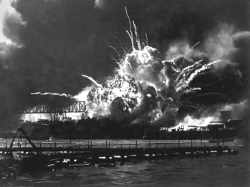Pearl Harbor

Few events in World War II were as defining as the Japanese sudden and unexpected assault on Pearl Harbor, which prompted our entry into the war.
It began on the morning of December 7th 1941, at 7:55am local time.
183 aircraft of the Imperial Japanese Navy attacked the United States Naval base at Pearl Harbor on the island of Oahu in Hawaii, with the intention of destroying and damaging as much of the US Pacific Fleet as possible, before it could respond to Japanese operations taking place on the same day against the British, Dutch and US territories in southeast Asia.
The second wave had 170 planes in it and attacked Pearl Harbor at 08:54am.
President Franklin D. Roosevelt famously declared the attack "A date which shall live in infamy" in a speech following the attack which was broadcast live on the radio at 12:30pm on December 9th. The whole nation tuned in.
Later that afternoon President Roosevelt signed the declaration of war against Japan.
To really capture the moment you can listen to the original broadcast on RUSC. Close your eyes and try to imagine just how chilling those words were, and what the horrific implications would be.
Other shows on RUSC of historic importance following the attack on Pearl Harbour are a show entitled Raid On Burma from the series Wings To Victory aired on the 1st April 1943, ABC Radio Workshop's, Tomorrow narrated by Orson Welles, which aired on 17th October 1956 and from Cavalcade of America, The Prophet Without Honor, which aired on 31st August 1942.
I have also added a new show to RUSC, called So Sorry No Mercy broadcast by the Cavalcade of America on March 27th 1944.
It is the story of the American correspondent Royal Arch Gunnison who foresaw the war with Japan and warned the world; who escaped the march of death in the Philippines and later in China and who came back to tell his story.
Royal Arch Gunnison also appears at the end of the story with a message of hope for those, at the time, still under Japanese domination.
Japan finally surrendered to the U.S. aboard the USS Missouri in 1945, ending World War II, six years and one day after it began.
Many of us have elderly family or friends who were involved in the attack on Pearl Harbor, or who enlisted in the immediate aftermath, and on the anniversary of the tragedy at Pearl Harbor, we honor the courage and sacrifice of those men and women.
